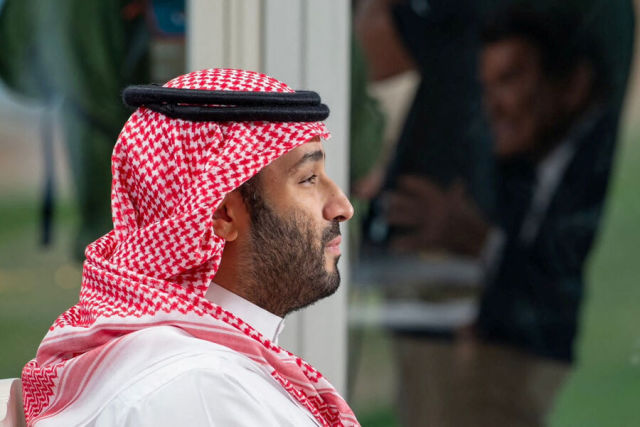Saudi Prince: who used nuclear weapons will start a war with the whole world
Saudi Crown Prince Mohammed bin Salman said in an interview with Fox News that if Tehran gets nuclear weapons, Riyadh will have to take a similar step "for security reasons." "The world cannot see another Hiroshima," and if 100 thousand people die, all countries of the world will turn against the aggressor, he noted. It is not the first time the Saudi prince admits the possibility of war with Iran. This time, Riyadh is supported by the Israeli authorities.
If Iran acquires nuclear weapons, Saudi Arabia will take a similar step "for security reasons to balance forces." This was stated by the Crown Prince of the kingdom Mohammed bin Salman in an interview with Fox News.
"The use of nuclear weapons by any country will mean that it is waging war with the rest of the world. The world cannot see another Hiroshima. If the world sees the death of 100 thousand people, it will mean that you are at war with the rest of the world. If they (Iran. - approx. "Newspapers.En") will get [nuclear weapons], we will get them too," the prince said.
Israel supported the Saudis
In turn, Israeli Prime Minister Benjamin Netanyahu instructed nuclear security specialists to cooperate with their counterparts from the United States to facilitate the implementation of the Saudi nuclear program. This was reported by The Wall Street Journal newspaper, citing sources in the Israeli and American establishment.
As the newspaper notes, Israel is the only country in the region that is a member of the "nuclear club", albeit secretly. For this reason, the WSJ claims, the Israeli authorities have been opposed for years to other countries in the region - political rivals of the Israelis - receiving such weapons. In addition, the opposition in Israel also opposes the Saudi program: former Prime Minister Yair Lapid believes that the development of Saudi Arabia's nuclear potential will lead to a nuclear arms race in the region, and other countries of the Middle East, for example, the United Arab Emirates, will join it.
The Wall Street Journal claims that many officials from Washington also disapprove of such prospects for Riyadh. The United States believes that if radical Islamists come to power there and they have nuclear weapons, the world will be in great danger. The WSJ reports that if Riyadh launches its nuclear program, Washington would like to tightly control the entire process. The newspaper notes, however, that Saudi Arabia has a different view of the problem - Mohammed bin Salman would like the kingdom to independently develop nuclear weapons.
The issue of the Saudi nuclear program was discussed during a meeting between US President Joe Biden and Netanyahu at the UN General Assembly in New York on September 20, Israeli sources claim. It is noted that Israel has requested strict security guarantees from the United States, regardless of the type of program that Riyadh will implement. So far, Biden has not approved any of the scenarios for the development of the situation.
The enmity of Iran and Saudi Arabia
Relations between Riyadh and Tehran are developing difficult. The countries are in conflict both on religious grounds - the Saudi authorities accuse Iran of supporting the Shiite opposition, when Tehran accuses Riyadh of violating the rights of the Shiite minority - and in economic, political, and military issues. Over the past year, there has been progress towards a "warming" of relations: in March 2023, the countries signed an agreement on the resumption of diplomatic relations and the opening of embassies within two months. Tehran also offered Riyadh to create a coalition in the region to ensure maritime security in the northern waters of the Indian Ocean.
However, the context of relations between the countries is not easy. In 2018, Mohammed bin Salman admitted the possibility of war with Iran in the near future. He called on other countries of the world to impose sanctions against Iran for economic and political pressure. "If we don't succeed in what we are trying to do, we will most likely have a war with Iran in 10-15 years," Mohammed bin Salman said.
In addition, Saudi Arabia actively opposed the lifting of sanctions against Tehran after the Obama administration concluded a nuclear deal with Iran.
On July 14, 2015, Iran and the six mediators (the United States, France, Britain, China, Russia and Germany) signed a Joint Comprehensive Plan of Action (JCPOA), which provides for the freezing of the Iranian nuclear program in exchange for the lifting of sanctions.
Tehran's Plans
By com/articles/iran-could-produce-nuclear-weapon-in-several-months-if-it-decides-to-do-so-mark-milley-says-ecd38f07 " target="_blank" rel="nofollow">US assessment if the Iranian government decides to build a nuclear weapons, it will be possible to do this in a few months, and it will take 12 days to create a special fuel. The White House believes that Iran "in no case" should be allowed to do this. In the event of the appearance of nuclear weapons in Tehran, Israel will receive "freedom of action," the United States promised.
In turn, Tehran insisted on the absence of plans to develop nuclear weapons. The IAEA claimed that there was no information about Iran's development and production of nuclear weapons. Nevertheless, Iran has a range of missile weapons capable of carrying a nuclear charge.
Mikhail Rodionov

